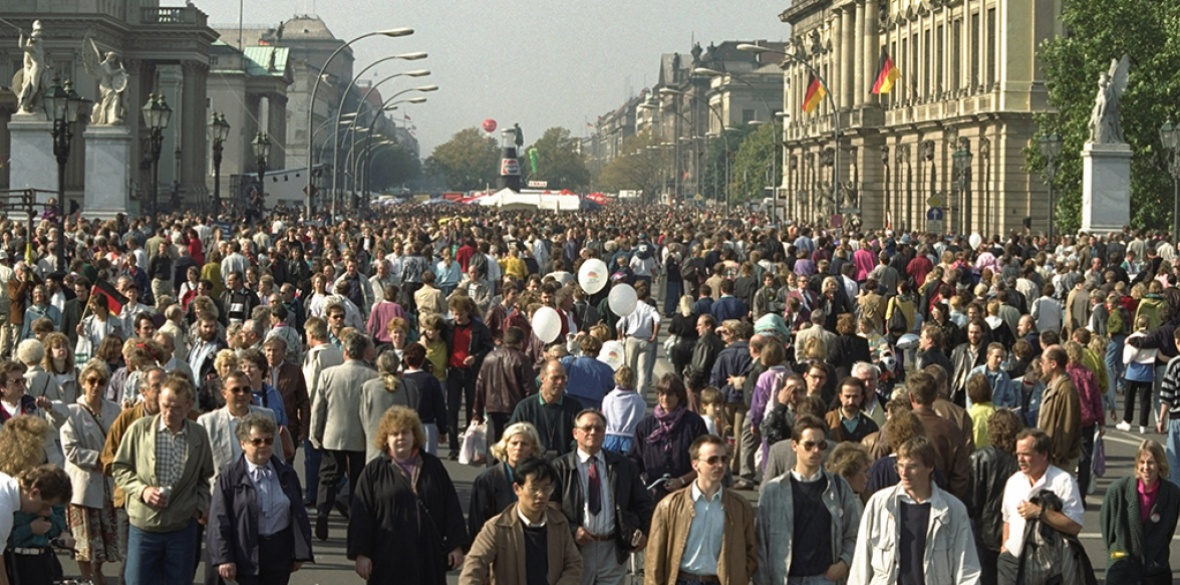THE 30th anniversary of German reunification this weekend will be marked by celebratory speeches and triumphalist op-eds.
The defeat of European socialism is presented as both a liberation from tyranny and the inevitable just deserts of an impossible and heretical alternative to the rule of the market.
As observers on the German left are noting, however, the story is rather more complicated.
Certainly millions of East Germans celebrated the fall of the wall and welcomed reunion of a country whose division was never desired by Germans but a result of decisions taken in foreign capitals — though few Western histories record that it was Washington that vetoed Soviet proposals of a Germany united but committed to neutrality, like Austria, because the US wanted to incorporate West Germany with its stock of battle-hardened Nazi officers into Nato (Adolf Heusinger, Hitler’s chief of staff in 1944, even became head of Nato in the 1960s).
But 1990 was followed by the takeover of the east’s economy — the rapid privatisation of thousands of enterprises, with 95 per cent being snapped up by West German firms or foreign corporations.
Mass layoffs saw millions lose their jobs and millions move west.
This explains why many in the east refer to 1990’s events not as “reunification” but “annexation” of the German Democratic Republic (GDR) by its western neighbour, as, in formal terms, it was: the GDR ceased to exist as it was swallowed by the Federal Republic.
The reality that the end of the GDR was more Western conquest than joyous reunification applies even more to another idealistic dream of the early 1990s, the “peace dividend” — the hope that the end of the cold war would mean demilitarisation and the reallocation of arms spending to socially useful purposes.
In fact, the promises made to the Soviet Union in its last years, as it withdrew its forces from eastern Europe, that Nato would not expand “one inch eastward” have all been broken.
Almost all the former European socialist republics are now Nato members, as are several former republics of the Soviet Union itself. Last month the United States piled hundreds more troops into Lithuania and led manoeuvres by thousands in Ukraine.
Absurd logical somersaults are used to present Russia, rather than the US-led alliance, as the aggressor in this process.
“What we have seen is that Russia maintains military presence close to Nato borders,” the alliance’s secretary-general Jens Stoltenberg lamented this year.
By which he meant that Russia has a military presence in Russia, since Nato now has a direct land border with it.
The character of Soviet and eastern European socialism is a historical question, which should be debatable on the left without leading to rifts. But it is high time the threat of anti-communism was recognised for what it is.
Far-right and fascist forces are on the rise across much of the world. Communist ideology and symbols are banned in countries like Ukraine and Hungary.
The US Secretary of State rails about the “evil” Chinese Communist Party and the supposed threat it poses to the “free world” in the language of a zealot while the government he serves rattles sabres from the Baltic to the South China Sea.
Its fondness for violent right-wing insurgency, sponsored for years in Venezuela and, with tragic success, in Ukraine and Bolivia, now extends to its president asking an armed white supremacist organisation to “stand by” during an election debate on live TV.
Thirty years after German unity symbolised capitalism’s victory over socialism, we can say with certainty that the world has become less safe as a result.
Liberal journalists have recently worried that the greatest threat to peace and stability is a rift in the transatlantic alliance. The reality is that it is that US-led alliance itself which threatens to bring our world down in flames.










